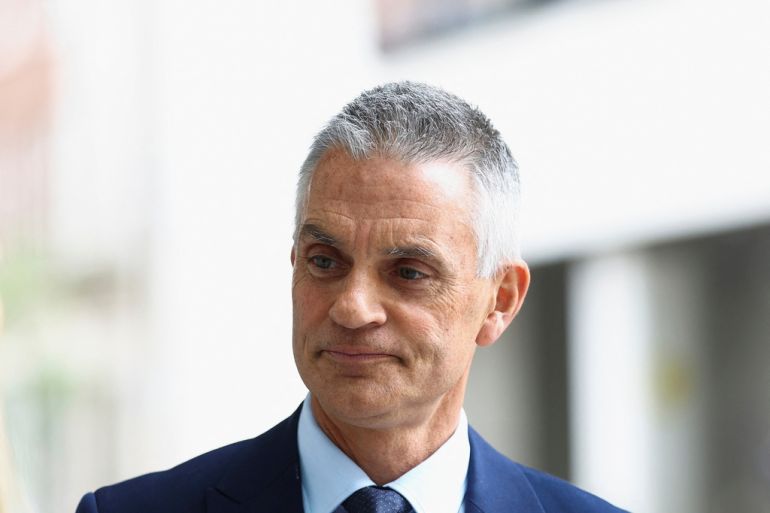BBC boss Tim Davie resigns after criticism over Trump speech edit
Davie’s exit caps a week of attacks on Britain’s public broadcaster, with Trump’s press secretary describing BBC as ‘100 percent fake news’.

Published On 9 Nov 20259 Nov 2025
Save
The director-general of the British Broadcasting Corporation (BBC) has resigned after a row over the editing of a speech made by US President Donald Trump on the day of the 2021 attack on the United States Capitol.
Sunday’s joint resignations of Tim Davie and head of news Deborah Turness capped a turbulent week of accusations that the broadcaster edited a speech Trump made on January 6, 2021, to make it appear as if he encouraged the riots that followed his defeat in the 2020 presidential election.
Recommended Stories
list of 3 itemsend of list
Davie said he took “ultimate responsibility” for mistakes made, saying that quitting his role at the helm of the public broadcaster after five years was “entirely my decision”.
“I have been reflecting on the very intense personal and professional demands of managing this role over many years in these febrile times, combined with the fact that I want to give a successor time to help shape the charter plans they will be delivering,” he said.
A documentary by flagship programme Panorama aired a week before last year’s US election, splicing together clips of Trump’s speech uttered at different points.
The edit made it seem as if Trump said: “We’re going to walk down to the Capitol and I’ll be there with you, and we fight. We fight like hell.”
Critics said it was misleading as it cut out a section where Trump said he wanted supporters to demonstrate peacefully.
‘Buck stops with me’
Turness said the controversy about the Trump documentary “has reached a stage where it is causing damage to the BBC – an institution that I love”.
Advertisement
“As the CEO of BBC News and Current Affairs, the buck stops with me,” she added.
Earlier on Sunday, UK Culture, Media and Sport Minister Lisa Nandy called the allegations “incredibly serious”, saying there is a “systemic bias in the way that difficult issues are reported at the BBC”.
Reporting from London, Al Jazeera’s Rory Challands noted that the BBC has always been in a difficult position.
“It is pilloried by the right, who perceive it to be a hotbed of liberal bias. It’s pilloried by the left, who think that it kowtows to the establishment and pumps out government lines when it comes to things like Gaza, particularly, not holding the powerful to account as it should do as a broadcaster.”
Accusations of anti-Israel bias
The controversy, whipped up by UK right-wing media, reached the other side of the Atlantic with Trump’s press secretary Karoline Leavitt describing the BBC as “100 percent fake news” and a “propaganda machine” on Friday.
The story broke on Tuesday when The Daily Telegraph cited a memo complied by Michael Prescott, a former member of the BBC’s editorial standards committee, which raised concerns over the Trump edit, as well as criticising perceived anti-Israel bias in the BBC’s Arabic service.
On Saturday, the newspaper reported right-wing lawmaker Priti Patel, of the Conservative Party, demanded the UK Foreign Office review its funding of BBC Arabic through its grant for the BBC World Service, alleging “pro-Hamas and anti-Israel bias”.
The broadcaster has also been accused of giving Israel favourable coverage in its reporting of the war on Gaza, coming under criticism from its own staff.
Davie’s resignation was celebrated by Nigel Farage, leader of the populist hard-right Reform UK party, which is soaring in opinion polls.
“This is the BBC’s last chance. If they don’t get this right there will be vast numbers of people refusing to pay the licence fee,” Farage said on X.

